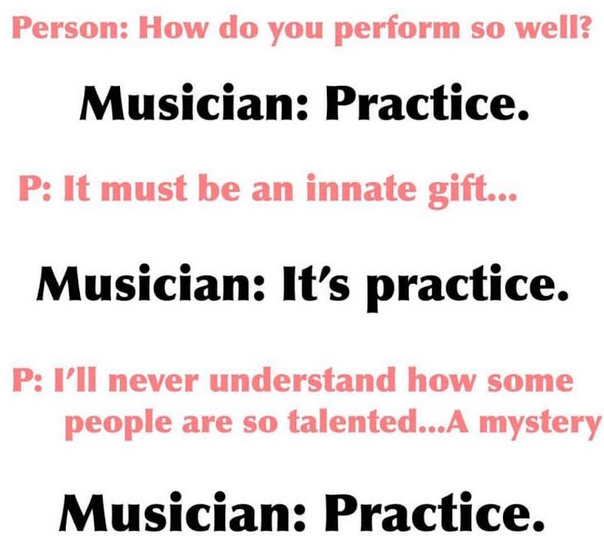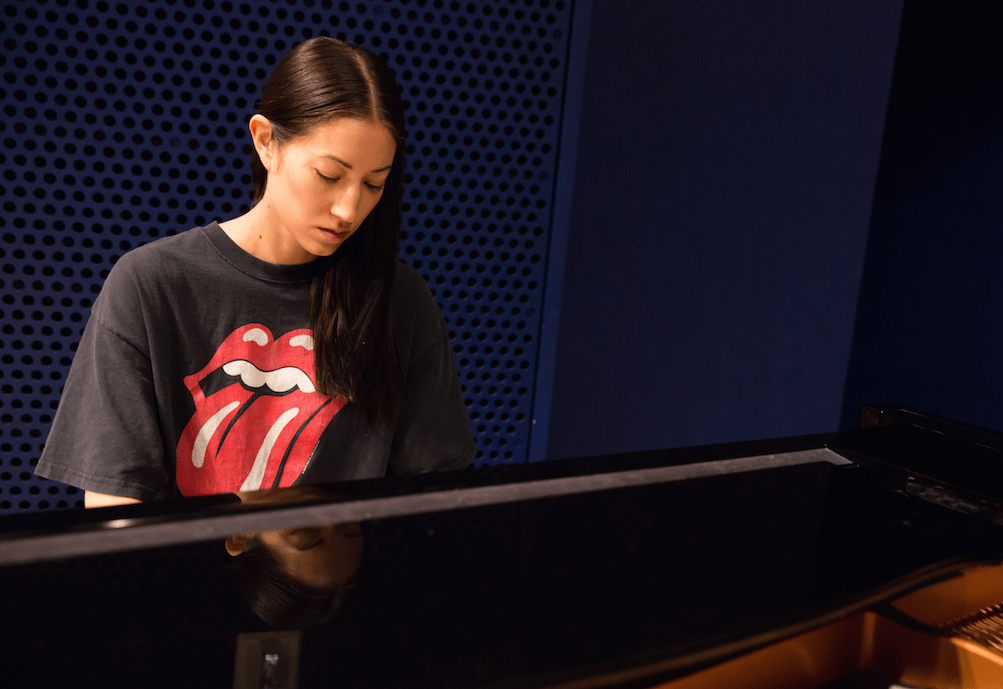Have you dabbled in and out of music for years? Are you frustrated with your lack of consistency around practicing your instrument? Have you concluded you just don’t have the discipline, it’s too late for you, or you aren’t innately talented? I’ve worked with many adult music students who otherwise have successful careers in finance, medicine, and education. They are smart, talented, and consistent in many other areas of their lives. But many appear and disappear.
We all get busy, but an interesting twist is these students typically express guilt and remorse for “falling off” again, as if learning music was some sort of moral issue or crash diet.
Can you relate? Chances are you love music and performance enough that you’ve built a decent foundation, but now you’ve plateaued, or even “quit.” 🙁
Good news! You are totally normal and this Resistance (with a capital R famously coined by author Steven Pressfield) is part of the creative process. Resistance is basically the thing that gets in the way of doing the thing (practicing, writing, filming, whatever) that would lead you closer to your creative goals. It takes the form of procrastination, avoidance, and buffering.
It has nothing to do with time management. Instead of working on our craft when we could, we do chose to do something else. Then feel horribly about wasting the time. It makes no sense. The hilarious part is we don’t even enjoy what we are doing in its place, because we know we are just moving farther away from where we want to be. Welcome to the creative dysfunctional family.

Pressfield, a phenomenal writer and thinker (read his stuff if you haven’t) clarifies that Resistance is impersonal, like gravity, and doesn’t mean anything. We can stop beating ourselves up. You can expect it like a change-up after three fast balls.
But then he kind of leaves us hanging. What causes Resistance? Here’s where I turn to super basic cognitive behavioral psychology.
Let’s assume you won’t adhere to practicing, you won’t practice deliberately, or haven’t touched your instrument in years. Why is that?
Our thoughts create our feelings and our feelings drive our action (or inaction). This action/lack of action creates positive or negative results.
Thought–>feelings–>action/inaction–>results.
Basically, if we have shitty thoughts we get shitty results, and vice versa.
Don’t just gloss over this. You will truly find the root of the issue!
Here’s an example:
Thought: “I should go to the gym. But ugh the machines are so busy right now… I don’t know how to use the free weights, I hate cardio. Plus last time I went it was hell and I don’t even see or feel a difference.”
Feeling: overwhelm, defeat, apathy
Action/Inaction: watch Netflix/no gym
Result: no physical improvement, regret not going, move farther from goals
Let’s apply this model to practice habits. Here are some super common thought patterns around musicianship that produce a negative chain reaction.
Overwhelm:
“ok… I have to learn hundreds of scales, chord progressions, ear training, rhythm, technique, transcriptions and omg what about lead sheets, Bach, and…”,
“Being a great musician involves torturous pain and bleeding fingers.”
Defeat/apathy:
“I have been working on this damn piece for months. An eight year old would’ve mastered it by now. I’m not cut out for this.”
“I don’t know how to get better [so I won’t try because I am not guaranteed results].”
“If I can’t play like Horowitz I’m not going to even bother.”
Excuses created from fear of failure:
“I am a wordsmith. This music stuff isn’t my forte.”
“I didn’t have an Asian parent or Russian teacher growing up, so I’m not going to be that good.”
“Talent is innate and I don’t have it.”
Doubt:
“This piece will never come together.”
“My teacher growing up never showed that much interest in me, so that means ________”
These thoughts cause feelings of doubt, defeat, apathy, and fear of failure.
When these are the forerunning emotions, chances are you won’t move toward them, but will seek refuge somewhere more comforting like the couch (or the bar, or social media).
Even if you do manage to muscle your way to the instrument, practicing with these thoughts floating around is like trying to drive with the emergency brake on—not sustainable (this was my personal favorite variation of Resistance).

Now the tricky part is you may not even know what you are thinking if you’ve never observed your own mind. You gotta metaphorically step back and listen, and transcribe your internal dialogue. Literally write your thoughts down so you can analyze them from a detached place. You may be surprised by what comes out. Our thoughts and actions always align!
I know an accomplished violinist playing for a major orchestra who is convinced he will never, ever make first violin. Why? According to him, it’s because he started violin at age 7, and not 3 or 4 [and only those who start that young have a chance]. He fixates on this thought (I know because he constantly brings it up), which has turned into a belief, and his actions align: he wouldn’t take a first violin audition if it was wrapped up in a bow. Result? Second violin forever!
Does he even know he’s thinking this thought over and over? I’m not sure. Shitty thoughts aren’t always overtly bad, even if they wreak havoc on your actions.
So now it’s your turn to examine your thoughts. What is an unchecked thought pattern that is getting in your way? Is it helpful? Is it true? How can you possible know that it is really true? Why do you want to learn music in the first place? Give yourself time, but get to the bottom of it.
Call yourself out. Your Mind Playing Tricks on You.
If you aren’t where you want to be musically, chances are you too are squandering valuable brainpower with useless, fictional thoughts. You could be engaging in some serious quality practice!
Once you identify where you stand mentally, you can begin to convince your mind otherwise, but take it easy. Changing your brain takes time but it’s worth it. Awareness is step one. Let me know how it goes!